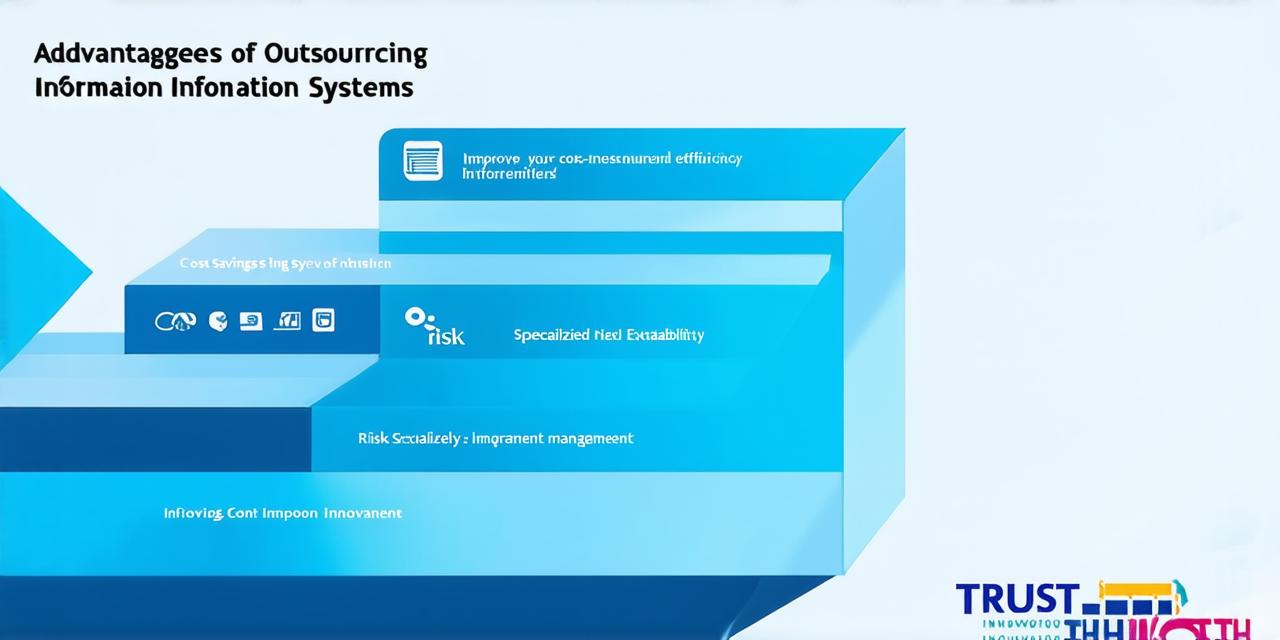Which of the following is an advantage of outsourcing information systems?
BlogAs technology continues to evolve and business demands increase, companies are increasingly turning to outsourcing information systems as a way to improve efficiency, reduce costs, and gain access to specialized expertise. In this article, we will explore some of the key advantages of outsourcing information systems, including:

-
Table of Contents
Toggle1. Cost Savings
-
2. Improved Efficiency
-
3. Specialized Expertise
-
4. Risk Management
-
5. Scalability
One of the main advantages of outsourcing information systems is cost savings. By outsourcing these functions to a third-party provider, companies can save on salaries, benefits, and other expenses associated with hiring and retaining IT staff. Additionally, outsourcing providers often have access to specialized technology and tools that may not be available in-house, allowing companies to invest in more cost-effective solutions.
2. Improved Efficiency
Outsourcing information systems can also help improve efficiency by freeing up internal IT staff to focus on other tasks and priorities. By outsourcing these functions, companies can ensure that their IT systems are running smoothly and efficiently, without having to worry about the day-to-day operations of these systems. Additionally, outsourcing providers often have experience in managing multiple clients, allowing them to bring best practices and standardized processes to bear on each client’s unique needs.
3. Specialized Expertise
Another advantage of outsourcing information systems is access to specialized expertise. Outsourcing providers often have teams of highly skilled IT professionals with expertise in specific areas, such as cybersecurity, data analytics, or cloud computing. By working with these experts, companies can gain access to the knowledge and experience needed to implement and maintain these complex systems. Additionally, outsourcing providers often stay up-to-date with the latest developments in technology, allowing them to bring best practices and cutting-edge solutions to their clients.
4. Risk Management
Outsourcing information systems can also help manage risk by providing a third party to handle critical IT functions. By outsourcing these functions to a provider with experience in managing multiple clients, companies can ensure that they have the resources and expertise needed to mitigate risks such as data breaches, system downtime, or compliance issues. Additionally, outsourcing providers often have disaster recovery and business continuity plans in place, allowing them to quickly respond to any unexpected events and minimize disruption to a company’s operations.
5. Scalability
Finally, outsourcing information systems can help companies achieve scalability by providing the resources and expertise needed to handle fluctuations in demand. By working with an outsourcing provider that has experience in managing multiple clients, companies can quickly scale their IT systems up or down as needed, without having to worry about hiring additional staff or purchasing new equipment. Additionally, outsourcing providers often have access to cloud-based solutions that allow for rapid deployment and easy scaling of IT resources.
Case Study: XYZ Corporation
XYZ Corporation is a manufacturing company based in the United States. The company had been managing its own IT systems in-house for many years, but was struggling to keep up with the demands of its growing business. In particular, the company’s IT staff were often overwhelmed with maintenance and support tasks, leaving little time for strategic initiatives or innovation.
To address these challenges, XYZ Corporation decided to outsource its information systems to a third-party provider. The provider offered a comprehensive suite of services, including cybersecurity, data analytics, cloud computing, and IT infrastructure management. By outsourcing these functions to the provider, XYZ Corporation was able to free up its internal IT staff to focus on more strategic initiatives, such as developing new products and expanding into new markets.
Over time, the company saw significant improvements in efficiency, cost savings, and access to specialized expertise. The provider’s cybersecurity team, for example, helped XYZ Corporation implement a comprehensive security framework that significantly reduced the risk of data breaches and other security incidents. Additionally, the provider’s cloud-based solutions allowed the company to quickly scale its IT resources as needed, without having to worry about purchasing new equipment or hiring additional staff.
